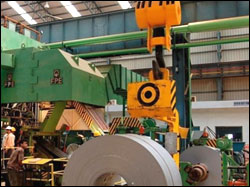If the monthly data of industrial production are to be believed, the capital goods sector has been contracting for nine months, with the exception of February 2012 when it grew by 10.50 per cent. The latest numbers (for June) show a sharp year-on-year decline of 28 per cent.
 Compare that with the June quarter results of the 17 companies in the Bombay Stock Exchange's Capital Goods Index. They have shown a 16 per cent increase in net sales. The big boys of the sector, Larsen & Toubro and Bharat Heavy Electricals Ltd (Bhel), have grown net sales by 26 per cent and 17 per cent, respectively.
Compare that with the June quarter results of the 17 companies in the Bombay Stock Exchange's Capital Goods Index. They have shown a 16 per cent increase in net sales. The big boys of the sector, Larsen & Toubro and Bharat Heavy Electricals Ltd (Bhel), have grown net sales by 26 per cent and 17 per cent, respectively.
There are some companies in the sector that have seen a decline in revenues but their performance is not sufficient to cause such a decline in industrial production data.
So, it's clear the capital goods sector is growing, going by sales figures. The problem is elsewhere: the future looks tense as the fresh order inflow is clearly down to a trickle. But that's not what the IIP data can capture.
Experts say the capital goods data in IIP reflect the despatches of goods at the factory level. While this kind of data collection works for industries like automobiles, the capital goods industry is a different kettle of fish. A capital goods company can take years to manufacture boilers, turbines and generators.
So, there's no guarantee that every month a boiler or turbine used in power plants will be despatched at the factory gate.
Such equipment, used by power producers, account for nearly 62 per cent of the capital goods industry. A private sector manufacturer of power equipment said the agencies did not come to them to collect data every month. Most of the data, he said, were derived from public sector enterprises such as Bhel and Bharat Electronics to figure out the growth in capital goods.
K Ravi Kumar, former chairman of Bhel and director of Abhijeet Power, said, "IIP numbers should be looked at retrospectively for a three-month period. Big companies, which have good order books, should not have much of a problem, even though their backlog might be reduced. Small companies will face a problem as there are not many orders."
This explains the sales growth in FY13, thanks to the orders placed a few years ago. Nidhi Agarwal, a capital goods analyst at Sharekhan, explained, "Industrial production data are based on factory despatches and are not a good indicator of the sector's growth because they are driven by order inflows from the past. Also, these data do not include the project component of the capital goods industry."
Companies in the capital goods space not only produce products used by different industries but they can also be into design, engineering and project execution. The IIP data do not reflect this aspect of the industry.
Undoubtedly, the capital goods sector is seeing a slowdown, as the power sector is facing major issues in terms of fuel supply and land acquisition. Along with independent power producers, even entities such as Mahagenco and APGenco are cancelling orders. However, that again is not reflected in the IIP numbers.










 © 2025
© 2025